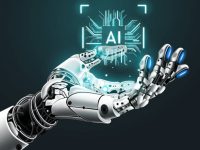In today’s fast-paced business environment, organizations continually search for ways to enhance productivity and streamline operations. One of the most revolutionary advancements in this quest is artificial intelligence (AI). By integrating AI technologies into the workplace, companies can improve efficiency, foster innovation, and drive better decision-making. Below, we explore the transformative benefits of Artificial Intelligence in the workplace.

1. Enhanced Productivity
First and foremost, AI can automate repetitive and mundane tasks. Consequently, employees can focus on more strategic initiatives that require human creativity and critical thinking. For instance, chatbots can handle customer inquiries around the clock, allowing human agents to engage with customers on more complex issues. Moreover, AI-driven tools can schedule meetings, manage emails, and even organize projects, making it easier for teams to collaborate effectively. This is one of the benefits of artificial intelligence.
2. Data-Driven Decision Making
Additionally, one of the standout benefits of AI is its ability to analyze vast amounts of data quickly and accurately. By leveraging machine learning algorithms, organizations can uncover patterns and insights that would be impossible for humans to detect. This capability allows businesses to make informed decisions based on real-time data, rather than relying on intuition alone. For example, AI can predict market trends, customer preferences, and even potential risks, enabling proactive strategies rather than reactive measures.
3. Improved Employee Engagement
Furthermore, AI can play a crucial role in enhancing employee engagement. With AI tools, organizations can gather feedback and analyze employee sentiment more efficiently. By understanding employee needs and preferences, companies can create a more fulfilling work environment. For instance, AI-driven platforms can suggest personalized learning and development opportunities, empowering employees to grow and thrive within their roles.
4. Cost Savings
In addition to boosting productivity and engagement, AI can lead to significant cost savings. Automating routine tasks reduces the need for extensive human resources, allowing companies to allocate their budgets more efficiently. Moreover, by optimising operations and improving decision-making, businesses can avoid costly mistakes and enhance their profitability. Ultimately, the benefits of artificial intelligence culminate in long-term savings and increased revenue.
5. Fostering Innovation
Moreover, AI fosters innovation by enabling organizations to experiment and develop new solutions rapidly. Through AI-powered analytics, companies can identify gaps in the market and explore new product ideas. Additionally, AI can facilitate collaboration among teams, allowing for the rapid prototyping of new concepts. As a result, organizations can stay competitive and adapt to the ever-changing business landscape. The benefits of artificial intelligence are clear in promoting growth and adaptation.
6. Enhanced Customer Experience
Finally, AI significantly improves customer experience. By utilizing AI, businesses can offer personalized services and recommendations, leading to higher customer satisfaction. For instance, AI algorithms can analyze customer behavior, allowing companies to tailor their marketing strategies and product offerings. Furthermore, AI can streamline customer service, ensuring quick and efficient responses to inquiries and complaints. Clearly, one of the benefits of artificial intelligence is the improved customer experience.


















One Comment